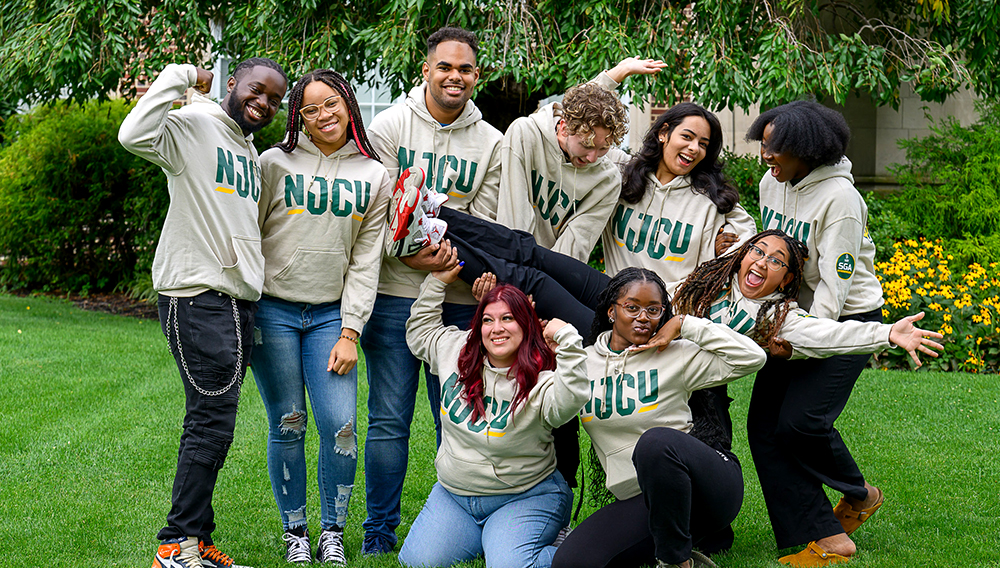
JERSEY CITY, NJ. December 10, 2024 (Hudson Latin Chamber) — New Jersey City University (NJCU) has announced the introduction of the institution’s first Student Development and Community Engagement Strategic Plan. This five-year strategic plan, spanning 2024-2028, is designed to foster an inclusive and empowering campus environment that nurtures student success, promotes civic responsibility, and strengthens connections between the University and its surrounding communities.
The Student Development and Community Engagement (SDCE) Strategic Plan is the fourth in a series of major strategic plans developed through NJCU’s renewed, long-term, strategic, mission-driven planning. The entire 32-page plan can be reviewed at www.njcu.edu/sdcestrategicplan.
The 2024-2028 Strategic Plan builds upon NJCU’s commitment to providing a transformative educational experience while embracing the changing needs of students and society. The plan outlines a comprehensive approach to student development, focusing on holistic growth, leadership opportunities, and creating pathways for students to engage with their communities.
This initiative underscores NJCU’s commitment to fostering an inclusive and supportive educational environment, while also exploring strategic partnerships with like-minded higher education institutions to enhance its mission.
The strategic plan focuses on four key objectives: increasing graduation rates, creating pathways to financial security for students and their families, addressing student challenges in alignment with the university’s mission, and enhancing the student experience outside the classroom. These outcomes are designed to support NJCU’s diverse student body, which includes a significant proportion of first-generation college students and those from underrepresented backgrounds.
The SDCE is another outcome of NJCU’s commitment to shared governance. Designed by the Division of Student Development and Community Engagement and authored by its vice president, the strategic plan was developed through extensive consultation with students, faculty, staff, alumni, and community leaders. Over the past year, numerous focus groups, surveys, and town hall meetings helped to ensure that the final plan reflects the needs, aspirations, and values of the entire NJCU community.
Similar to the previously introduced Academic Master Plan (AMP) and Strategic Enrollment Plan (SEP), the new SDCE Strategic Plan is driven by four (4) new institutional strategic pillars: (1) Student Success and Retention, (2) Community Engagement, (3) Culture of Continuous Improvement, and (4) Financial Stewardship and Responsibility.
NJCU Interim President Andrés Acebo praised the importance of the introduction of the Student Development and Community Engagement Strategic Plan, saying: “As we unveil the Strategic Student Development and Community Engagement Strategic Plan, we reaffirm our unwavering commitment to our students and the community we proudly serve. At New Jersey City University, we believe in breaking barriers, fostering inclusion, and transforming obstacles into opportunities. This plan is a bold testament to our mission—to create an environment where every student can persist, thrive, and achieve their fullest potential. Together, with our partners and stakeholders, we will build a future defined by resilience, collaboration, and boundless opportunity for all.”
Erin McCann, NJCU’s Vice President for Student Development and Community Engagement, emphasized the importance of this plan in shaping the future of student life at NJCU. “Our goal is to create a campus environment where every student feels empowered to thrive—academically, socially, and professionally. The Student Development and Community Engagement Strategic Plan will be the cornerstone of our efforts to support students in their educational journeys and beyond.”
Key measurable organizational actions (KOAs) and key performance indicators (KPIs) were developed to achieve nine goals outlined in the plan. Key Objectives of the Plan include:
● Enhancing Student Well-being: Expanding access to resources and programs that support the mental, emotional, and physical health of students, including counseling services, wellness initiatives, and support networks.
● Fostering Leadership and Civic Engagement: Developing opportunities for students and alumni to become leaders on campus and in their communities through mentoring, networking, and community-based learning.
● Building Inclusive Communities: Promoting diversity, equity, and inclusion in all aspects of student life, and thus creating a campus culture where all students feel supported and valued.
● Strengthening Community Partnerships: Deepening NJCU’s role as an anchor institution in the region by forging new partnerships with local organizations, schools, and businesses that offer students meaningful experiences and contribute to the vitality of Jersey City and beyond.
In Spring 2024, NJCU previously announced its first Strategic Enrollment Plan (SEP) and Academic Master Plan (AMP) during phase two and three of its strategic planning. Phase one was the release of the New Jersey City University Recovery and Revitalization Plan: A Framework for Long-Term Financial Sustainability, Mission Focus, and Student Success in April, 2023.
Looking ahead, the implementation of the SDCE Strategic Plan has already begun with the creation and launch of the Center for Student Persistence and Success in November. It will continue with phased rollouts of new initiatives and programs designed to meet the outlined goals. NJCU is committed to continually assessing the impact of these efforts to ensure that they meet the evolving needs of students and the community.
ABOUT NJCU
New Jersey City University is a comprehensive public regional institution committed to providing a high-quality education to a diverse student population. Located in Jersey City, New Jersey, NJCU offers a wide range of undergraduate and graduate programs and is dedicated to fostering an inclusive and supportive environment for learning, professional development, and community engagement. Recognized as a top university for improving upward economic social mobility, students enrolled in our undergraduate, graduate, or doctoral programs have access to an affordable, diverse environment, and an exceptionally supportive faculty. This prepares them to go on to become the next generation of workers and leaders who improve their communities and the State of New Jersey.


